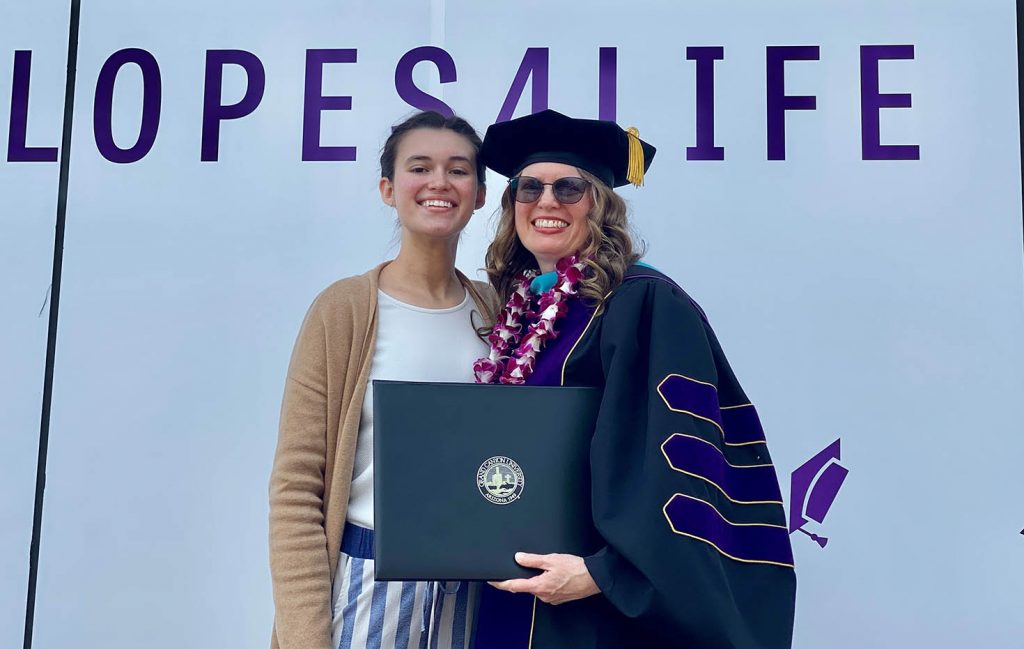
Her husband was a state trooper in North Carolina, and she accepted that he risked dying in the line of duty. But she never expected this.
During a Nov. 29, 2009, traffic stop on the side of the interstate, a car slid out of control on the wet road and smashed into the back end of his patrol car so violently it pushed the back seat to the front, breaking his bones and worse. The jarring collision left Humberto Reyna, a former collegiate cross country runner, avid golfer and swimmer with a traumatic brain injury (TBI).
Dr. Patricia Kay Reyna was his high school sweetheart who married him 20 years earlier. She never went to college and did accounting in a secondary school. The life she knew was over.
“The man I married didn’t come back home. Somebody that looked like him did,” Reyna said.
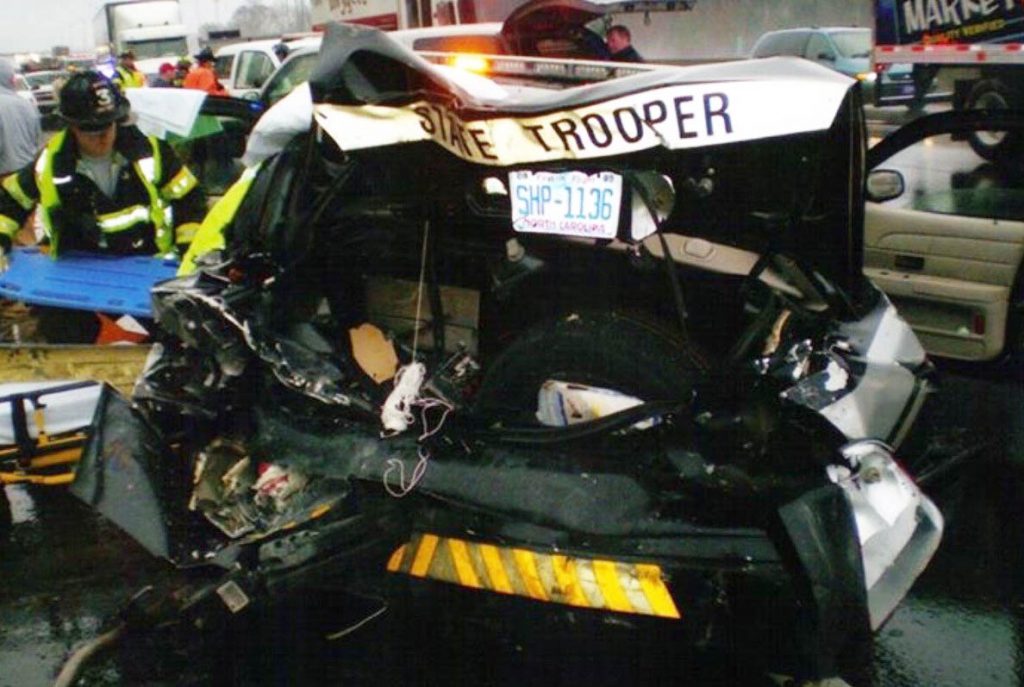
Humberto significantly lost cognitive skills. He went entire days without saying anything. No one could touch him. He was like a child. He always needed someone with him. Reyna cared for him 24-7.
She was devastated but took care of her husband and three children, the youngest age 12. She fought to get care for him. Those in law enforcement, fire fighters and other first responders have few options, unlike military veterans with TBI, she said.
So this is what she did.
In 2012, she logged online to get an education. While tending to her husband at home, she earned a bachelor’s degree in Christian Studies at Grand Canyon University, adding community college credits to finish in less than 1 ½ years.
By 2017, she had earned her master’s at GCU in Christian Studies with an Emphasis is Christian Leadership. And five years after that, she earned her doctorate at GCU in Organizational Leadership.
She did all this while caring for her husband and starting a nonprofit that would help Humberto and others find companionship and a purpose.
Reyna is not done. She’s continuing research that she started with her dissertation to show that first responders can find help with online interventions and need more resources and help to live a more fulfilling life.
“People told her not to expect more. She didn’t take that for an answer,” said Kayli Reyna, the daughter who was 12 at the time of the accident and today is following in her footsteps, studying for her own doctoral degree at GCU.
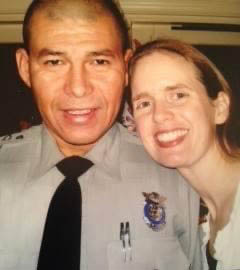
“The solution she found? She needed to get an education. I mean, this woman cannot be stopped. She is not going to take no for an answer.”
Patricia Kay Reyna joked that she probably needed more therapy. But her studies became therapeutic, “It kept my mind on positive things.”
The driving force behind those studies is her husband, learning much during the years following the accident.
“I didn’t know then that if you were injured as a law enforcement officer there are no services to help you. He had to be dead,” she said. “I discovered he needed to be with others like him.
“I didn’t want to put my husband in an institution. Who wants to do that at age 42? He literally stood against the wall. I asked doctors, ‘What am I going to do with him? We are way too young here, what are we going to do with his life?’”
The doctor asked what Humberto did before. Run, golf, swim, she said. “That’s what he’s gonna do,” he told her.
Most groups were for injured military veterans, so she took him there. They went around the circle for names and she thought, no way is he going to respond, but he said his name. They went around again and asked them to list something people don’t know about you.
“He can go an entire day without saying a word to me but when they came around to him he said, ‘I belong to Jesus Christ.’ That floored me.
"But because he wasn’t a veteran he couldn’t come back. That night in the hotel, I anguished over it, cried over it. That was when I started Operation Homeland Honor.”
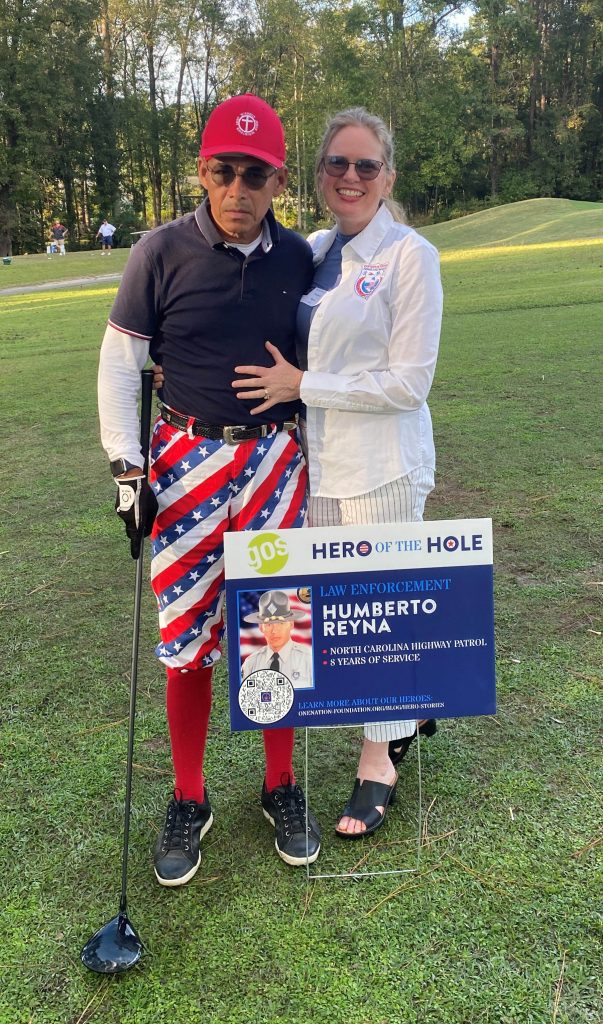
The nonprofit holds adaptive sporting events, especially golf where Humberto attained a world ranking. Humberto also got involved in Challenged Athletes Foundation, which held the Ironman 70.3 Oceanside on April 1 that he triumphantly finished.
“At these events, I see a little spark of him that is still in there,” she said.
Meanwhile, she was running her own triathlon of education degrees while learning more about TBI and its effects on families. Many marriages dissolve under the weight that caregivers carry with little help, she said, and suicide ideation is more prevalent among TBI victims and family members.
“It’s a race against time. We have to put this research out there,” she said.
What she found in her dissertation research, conducted during the pandemic, was that online intervention could increase knowledge and self-efficacy among caregivers of injured first responders, which results in a “significant improvement in hope.”
“My interest is hope,” she said. “Hope decreases suicidal ideation. Hope mediates caregiver burden. This is exciting because this is an unserved group who are struggling across the country.”
She learned what online intervention can do in her own life – through her education.
“I could never have done this without GCU. Their online degrees allowed me to complete my BA, master’s and doctorate while taking care of my husband – and even my research,” she said. “My residency was my first time away from him, and he laid on the floor and cried; he thought I had left him. But by the end of the residency I was convinced I could walk across the stage.”
She credits divine intervention for leading her to randomly selected dissertation chair Dr. Melissa McCart, who happened to be at the Center on Brain Injury Research and Training (CBIRT) at the University of Oregon.
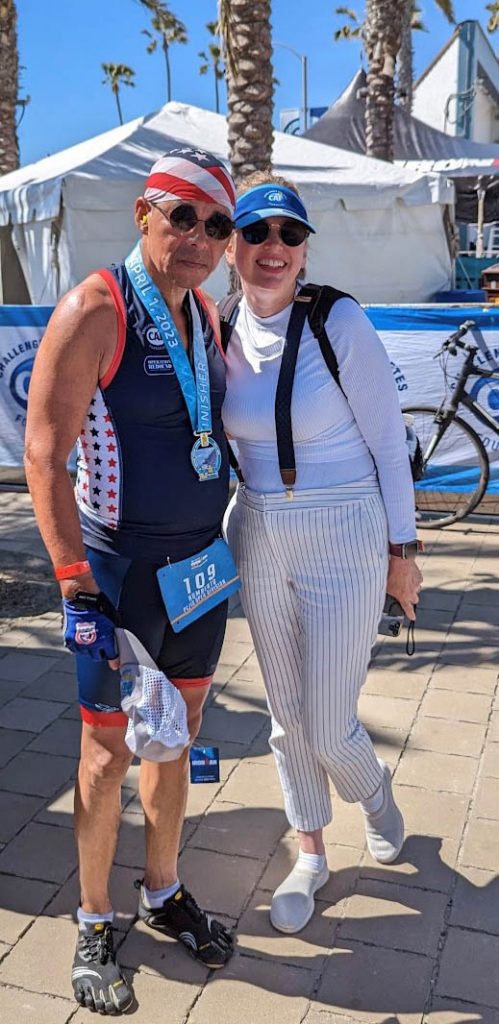
“She was the hardest working student I have ever worked with,” McCart said. “It seems as if God was involved in having her assigned to me.”
Reyna still isn’t done. She not only is a content expert for doctoral learners at GCU but is conducting research through CBIRT, documenting the experiences of caregivers to first responders with TBI or catastrophic injury and looking at data on first responders who died by suicide in the U.S.
“It is really difficult for our families. I am so broken hearted for them, and if I can pave a way to help make it better ... We need to try to save these families. We can’t continue to yell at drowning people to save themselves. They can’t. We have to help them.”
To do that, it takes money she is trying to raise to do the research that can prove the need for more funding for programs — even if its's simply a yearly regional retreat so caregivers don’t feel so alone.
It’s been 14 years since the accident, but she says it’s taken that long to feel like she is doing something now that can help others.
It’s the reason her own daughter is seeking more education — toward a doctorate in Organizational Leadership to help public libraries that “fight for people without a voice.”
“We went through this together with my dad. When it first happens you need that foundation so you don’t go crazy, because the state will say you are crazy,” Kayli Reyna said “You need someone to say the system is broken and needs to be fixed. That is her goal.”
It all comes back to her high school sweetheart, and the moments the light came on for her, when she saw a part of him fully engage in life again.
A group bicycling ride that Humberto went on sticks in her mind.
“When he came home from the hospital we couldn’t touch him. Four and a half years later, after three days of riding, he put his arm around my shoulder. I thought, ‘This is it.’”
That tiny spark of hope that makes all the difference.
Grand Canyon University senior writer Mike Kilen can be reached at [email protected] or at 602-639-6764.
***
Related content:



































































